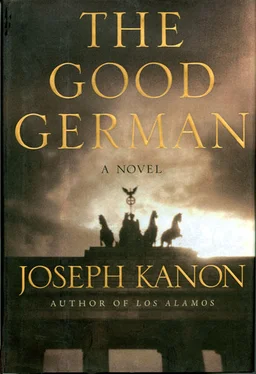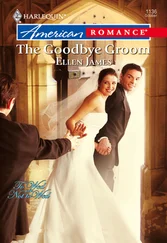More laughter. He moved silently toward the doorway, sweating. He wiped his palm dry, wrapped the end of the belt around it, gripping it, and held out the buckle, fixing his eye on the radiator. If it took more than a second, he’d be dead. A short intake of breath for good luck, then he darted forward, slipped the buckle on the handle, and scrambled over the sill. A small clink of metal as it hooked on, evidently unheard over the Russian talk, then a strained grunt as he dropped, catching the belt with his other hand, holding on, trying not to fall, his feet dangling in open air. He held tight for an instant, not trusting the belt yet, then felt himself slipping, a raw burning as the leather slid through his hand until it reached the other buckle, something to grip. Both hands now, his entire weight hanging by a single brass prong, his arms beginning to cramp.
He looked below. Rubble, not a flower bed. He’d need all of the belt, every foot a hedge against a broken ankle. The windows in the back were holes in a smooth facade, no lintels, nothing to break his fall but a pipe that branched off from the corner and snaked across the wall. Europe, where they put the pipes outside. He tried to guess the distance. Maybe just close enough if he let the belt out, something to hold his feet until his arms came back. Then a close slide down, grabbing the pipe in time, a drop in stages. A cat burglar could do it.
He moved his hands carefully off the buckle, just an inch, to the thinner leather of Emil’s belt. One over the other, his hands stinging from the leather burn, as if he were gripping nettles. Still no sound from above, just his own ragged panting and the scrape of his shoes against the plaster. Almost at the pipe.
And then it gave. Either the radiator handle or the other buckle, impossible to tell which, broke off, and he plunged with the belt, his feet hitting the pipe and bouncing off, his hands reaching out for anything on the wall until they met the pipe and clutched, stopping his body with a wrench of his shoulders. He held on, his body jerking, trying to stop his legs from flailing, and then he was going lower again, the pipe bending, weakened, too light for his weight, a groan at the joint near the corner and then a crack, like a shot, as it snapped and a loud crash as he went down with it, metal clanging against the rubble and his own cry as his body smashed against the ground. For a moment he seemed to black out, an absolute stillness between breaths, then another piece of pipe clattered down and he heard shouts from the window, the air filled with noisy alarm, as if dogs had started barking.
Move. He raised his head, wet at the back, a flash of nausea, and rolled slightly on his shoulder, wincing from a sharp pain. His feet, however, seemed all right-just a dull ache in one of the ankles, throbbing with the shock of the fall but not broken. A white shirt anyone could pick out in the darkness. He rolled toward the wall and pulled himself up, bracing against it so that if he fainted he’d be falling backward, not into firing range. Louder shouts now, probably the guards. He sidled toward the recess of a doorway, still in shadow, then jumped, startled at the sound of the blasts, a machine gun firing at random down into the yard. The first thing he’d learned about combat-how the sound exploded in your ears, loud enough to reach inside you, right into the blood.
He pressed into the doorway, away from the bullets. Was it open? But the hotel was a trap, the last place he’d be safe. And what if they weren’t out yet? Head away from the Linden, a few more seconds of diversion. He looked around the yard, trying to fix its layout. An unbroken wall to the corner, then another, seamless. No, a gap where it had been damaged by shelling. Which might not lead anywhere, a rat hole. But the yard itself was impossible-one streak of his white shirt and the bullets would have him. And now there was more light, slim shafts from flashlights, darting in confusion, then raking steadily across the rubble, strong enough to poke into corners, picking up piles of debris and the dull gleam of the pipe, coming toward him. In a minute he’d be in the beam, trapped, like one of the boys huddling against the Volga cliffs, easy target practice.
He bent down, picked up a piece of brick, and hurled it right toward the broken pipe, a desperate ring toss. It hit. A sharp clang, with the flashlight beams jerking back, another burst of shots. Without even testing his ankle, he bolted left toward the gap, hearing the crunch of broken plaster under his feet, more shouts in Russian. Just a few more steps. Endless. Then the light was back, shining against the wall and the shelling hole, drawing fire again. He crouched down in a feint, making the light follow him, then leaped away from it and dived into the gap, rolling downward on his bad shoulder and covering his head as the bullets ripped into the plaster at the opening, a furious ricochet whistling, just a foot or so too high. His whole body shaking now, finally in the war.
He rolled again, away from the opening, on a floor covered with glass and scattered papers, office litter. Bullets still tore into the room, one of them hitting metal with an echoing zing. He took his hand away from the back of his head, sticky with blood, opened when he’d hit the ground in the fall, and thought of Liz’s throat, gushing. Just one bullet. All it would take.
And then suddenly the bullets stopped, replaced by more shouting. He kept rolling until he reached a hulk of metal, a filing cabinet, and crawled behind it, raising his head to look out. There were heads at all the windows now, looking at the yard, yelling to each other, but none at Sikorsky’s, the machine guns redeployed, no doubt racing down the stairs, already after him.
He felt his way through the dark room to another, heading toward what he thought must be Wilhelmstrasse, a diagonal from the Adlon wing. Keep going away from the Linden. The next room was lighter, open to the sky, and he saw that he had left the standing part of the building behind. Now there was just a small hill of rubble, then an open patch to the ruined shell of the front. He started running toward the street. They’d come through the courtyard behind. He’d have a few seconds to get out, melt into the ruins while they searched the back of the Adlon. But when he came to an opening, ready to spring, he could hear the boots clomping in the street. Front and behind.
He headed right, snaking his way around another mound of bricks, still parallel to the street. They’d go first to the room with the filing cabinet, hoping to find him dead, not down Wilhelmstrasse. He took in the street again through the building shell. Just keep going. Another room, big, with twisted girders sticking up like teepee frames. Behind him, he could hear the boots entering the building. All of them? One more room, quietly. He stopped. Not just rubble; a small mountain, even the shell collapsed in, a dead end in the maze. He’d have to go back. But the boots were there again, crunching, fanning out through the building. He looked up toward the dark sky. The only way out was over.
He started up the pile, terrified that a slip would dislodge the bricks, send them tumbling down like alarms. If he could make the top, he could get to the next building, breathing space while they searched this one. He reached up, shoulder aching, scrambling on all fours. Bricks moved, settling and falling away as he found one foothold after another, but no louder than small clinks, not as loud as the Russians, still yelling from room to room. But what if the mound dropped sheer on the other side, propped up by a standing wall?
It didn’t. When he reached the top, lying down, he saw that it became one of those aprons of rubble that spilled into the street, without a connection to the next building. He also saw, ducking his head, lights sweep into the street, an open Soviet military car, Sikorsky jumping out, gun in hand, then pointing the car down the street, away from the Linden. Sikorsky stood for a minute, looking everywhere but up, and it occurred to Jake that he could just lie here, perched on his mountain, the one place they’d never look. Until when? The morning sun caught his white shirt and they surrounded him with guns? Another car came down the street, idled while Sikorsky gave a direction, and moved on to Behrenstrasse, the next cross street down, blocking that route. Now the only way out was the unbroken western side of Wilhelmstrasse, if he could get there before the headlights lit up the street. He watched Sikorsky take one of the soldiers and head into the building. Now, while the car was still turning into Behrenstrasse.
Читать дальше












